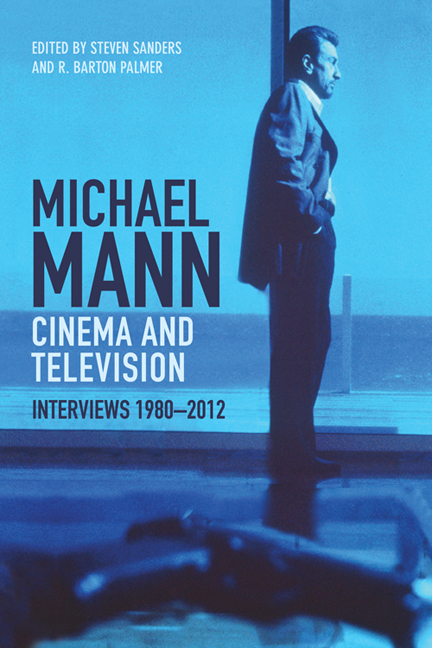Book contents
- Frontmatter
- Contents
- List of Illustrations
- Acknowledgements
- Introduction: Michael Mann in His Interviews
- 1 Four Minute Mile
- 2 Castle Keep
- 3 Of Vice and Mann
- 4 Manhunter: An Interview with Michael Mann
- 5 Michael Mann: Hollywood Writer–Director–Producer
- 6 Mann and His Movies
- 7 All the Corporations’ Men
- 8 Smoking Gun
- 9 “Ali Likes the Film a Lot. He's Seen it Six Times”
- 10 Paint it Black
- 11 Mann Among Men
- 12 L.A. Belongs to the Coyotes
- 13 Michael Mann Interview
- 14 A Mann's Man's World
- 15 Number One with a Bullet
- 16 The Study of Mann
- Chronology
- Filmography
- Publisher's Acknowledgments
- Index
11 - Mann Among Men
Published online by Cambridge University Press: 05 September 2016
- Frontmatter
- Contents
- List of Illustrations
- Acknowledgements
- Introduction: Michael Mann in His Interviews
- 1 Four Minute Mile
- 2 Castle Keep
- 3 Of Vice and Mann
- 4 Manhunter: An Interview with Michael Mann
- 5 Michael Mann: Hollywood Writer–Director–Producer
- 6 Mann and His Movies
- 7 All the Corporations’ Men
- 8 Smoking Gun
- 9 “Ali Likes the Film a Lot. He's Seen it Six Times”
- 10 Paint it Black
- 11 Mann Among Men
- 12 L.A. Belongs to the Coyotes
- 13 Michael Mann Interview
- 14 A Mann's Man's World
- 15 Number One with a Bullet
- 16 The Study of Mann
- Chronology
- Filmography
- Publisher's Acknowledgments
- Index
Summary
Michael Mann has a modus operandi as distinctive as any master criminal's. He's a hard-boiled sensualist: half muckraker and half fabulist. If he had been born 100 years ago, he'd have followed Jack London's path, not just into bareknuckled journalism but also into transcendent evocations of the beautiful and the wild.
Talking to Mann is as surprising as it is stimulating. His unfettered intuition and exquisite awareness compel your rapt attention. It's as if you're tuning your radio dial to a brainy, original talk show host on a faint college-town station – you strain not to miss his special code words and hard-won observations. You feel Mann gets extraordinary commitments from actors like James Caan in Thief (1981) or Tom Noonan and Brian Cox in Manhunter (1986) or Daniel Day-Lewis in The Last of the Mohicans (1992) because he catches them up in his enthrallment with his material.
When I listen to tapes of the marathon interview sessions I held with him five years apart, one before the release of Thief and the other before the release of Manhunter, they sound as if they're halves of an ongoing conversation, whether he's discussing his past or the projects then at hand. He grew up near “the Patch,” one of the roughest areas of Chicago. (“It was very aggressive, it was very masculine and it was very heterosexual.”) He still has a flat-A accent. “In my neighborhood,” he once told me, “anyone who carried around a camera would be considered a ‘fairy.’ “ By his count, only 13 of his high school graduating class of 365 went on to college, Mann included. It was at the University of Wisconsin in Madison, where he majored in English, that movies first got their hooks into him. The film that clinched the obsession was (appropriately enough) G.W. Pabst's coruscating study of urban vice, The Joyless Street (1925). By the time he graduated from college, Mann knew he wanted to make movies. But he didn't like the curricula of most American film schools: “It was like vocational training. You're not supposed to do ‘student’ films; you're supposed to do a show reel.”
- Type
- Chapter
- Information
- Michael Mann - Cinema and TelevisionInterviews, 1980-2012, pp. 85 - 90Publisher: Edinburgh University PressPrint publication year: 2014



